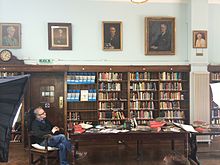Conway Hall
| Conway Hall | |
|---|---|
 Conway Hall, now numbered as 25 Red Lion Square, London, WC1R 4RL | |
 | |
| General information | |
| Type | Concert Hall |
| Architectural style | Art Deco |
| Address | 25 Red Lion Square, London, WC1R 4RL |
| Country | England, United Kingdom |
| Coordinates | 51°31′11″N 00°07′06″W / 51.51972°N 0.11833°W |
| Construction started | February 1928 |
| Inaugurated | 23 September 1929 |
| Cost | GBP £28,485 (1928) |
| Owner | Conway Hall Ethical Society |
| Design and construction | |
| Architect(s) | Frederick Herbert Mansford |
| Main contractor | John Greenwood Ltd |
| Website | |
| Official website | |
| References | |
| Conway Hall History | |
Conway Hall is a building in Red Lion Square, London. The structure, which is the headquarters of the Conway Hall Ethical Society, is a Grade II listed building.[1]
History
[edit]

The building was commissioned by the South Place Ethical Society, which had previously been accommodated in a chapel in South Place, near Finsbury Circus. The site they selected, in Red Lion Square, was a tenement, previously used as a factory belonging to James Perry, a pen and ink maker.[2]
The new building was designed by Frederick Mansford in the Art Deco style, built in silver-grey brick with red brick detailing and was officially opened on 23 September 1929.[1][3][4]
It was named after an American, Moncure D. Conway, who led the Society from 1864 to 1885 and from 1892 to 1897.[5][6] Speakers at Conway Hall have included George Orwell, who took part in a demonstration demanding freedom of the press there in November 1945.[7]
During a National Front meeting at the building in June 1974, there were clashes between the National Front, anti-fascists, and police stationed to keep the peace; 54 demonstrators were arrested, many were injured, and one anti-fascist, Kevin Gateley, was killed.[8]
Architecture
[edit]The new building was built on an L-shaped strip of land which the Society had acquired between Theobalds Road and Lamb's Conduit Passage. It was Mansford's largest project. The main entrance is located on an angle with a narrow arch rising to the top of the first floor. The arch is flanked by two columns in silver-grey brick while the rest of the building is varied with red-brick detailing. There is an opening with four doors on the ground floor, a Diocletian window on the first floor and a Venetian Window on the second floor. The glazing bars form a distinctive tiny criss-cross pattern reflected in Conway Hall's logo. The general feel is that of the Royal Shakespeare Theatre at Stratford-upon-Avon.[9]
Mansford was aware that his design could appear incoherent and tried to make the elevation hang together by placing six stone urns, bought from a City bank, along roof level, two of them on top of the entrance columns.[9]
The main auditorium can hold 300 plus 180 in a gallery, and in recent years has been used as a corporate events space for conferences and product launches. The use of wooden panelling nailed directly to the brickwork and of acoustic plaster gives the hall excellent acoustic qualities; this makes it very suitable for the performance of music, and there have been regular recordings and concerts there. The ceiling of the auditorium was glazed, and this made it very light and airy for the time. It opened in 1929 and has continued in use since.[10]
Above the proscenium arch the words "To Thine Own Self Be True" (quoting Polonius in Shakespeare's Hamlet) can be seen. These words were originally inscribed on the back wall of the red mahogany panel at the original South Place Chapel.[9]
Library
[edit]The Humanist Library and Archives based on the first floor is the UK's foremost resource of its kind in Europe and the only library in the UK solely dedicated to the collection of Humanist material.[11]
Film location
[edit]The hall has been used as a location for various film and television productions. The building has appeared in Mr. Holmes[12] and Hereafter.[13]
References
[edit]- ^ a b Historic England. "Conway Hall (1392343)". National Heritage List for England. Retrieved 15 June 2024.
- ^ "Perry and Co". Graces Guide. Retrieved 15 June 2024.
- ^ Foundation stone on the face of the building.
- ^ "Conway Lall". Humanist Heritage. Retrieved 15 June 2024.
- ^ "Conway, Moncure Daniel (1832–1907)". Virginia Humanities.
- ^ Moncure Daniel Conway (June 2001). Autobiography Memories and Experiences of Moncure Daniel Conway. Volume 2. Elibron.com. p. 14. ISBN 978-1-4021-6692-1. Retrieved 1 December 2012.
- ^ "Orwell and Freedom". The Orwell Society. Retrieved 15 June 2024.
- ^ Fielding, Nigel (1981). The National Front. London: Routledge & Kegan Paul. pp. 166–167. ISBN 978-0710005595.
- ^ a b c MacKillop, I.D. (1986). The British Ethical Societies. Cambridge University Press. ISBN 9780521266727. Archived from the original on 15 June 2024. Retrieved 13 May 2014 – via books.google.com.
- ^ MacKillop, I.D. (2011), The British Ethical Societies, Cambridge University Press, pp. 69–70, ISBN 9780521266727, archived from the original on 15 June 2024, retrieved 23 September 2020
- ^ "Our library". Conway Hall. Archived 25 May 2014 at the Wayback Machine [Accessed 13 May 2014]
- ^ "Mr Holmes". Reel Streets. Retrieved 15 June 2024.
- ^ "Conway Hall". Reel Streets. Retrieved 15 June 2024.
